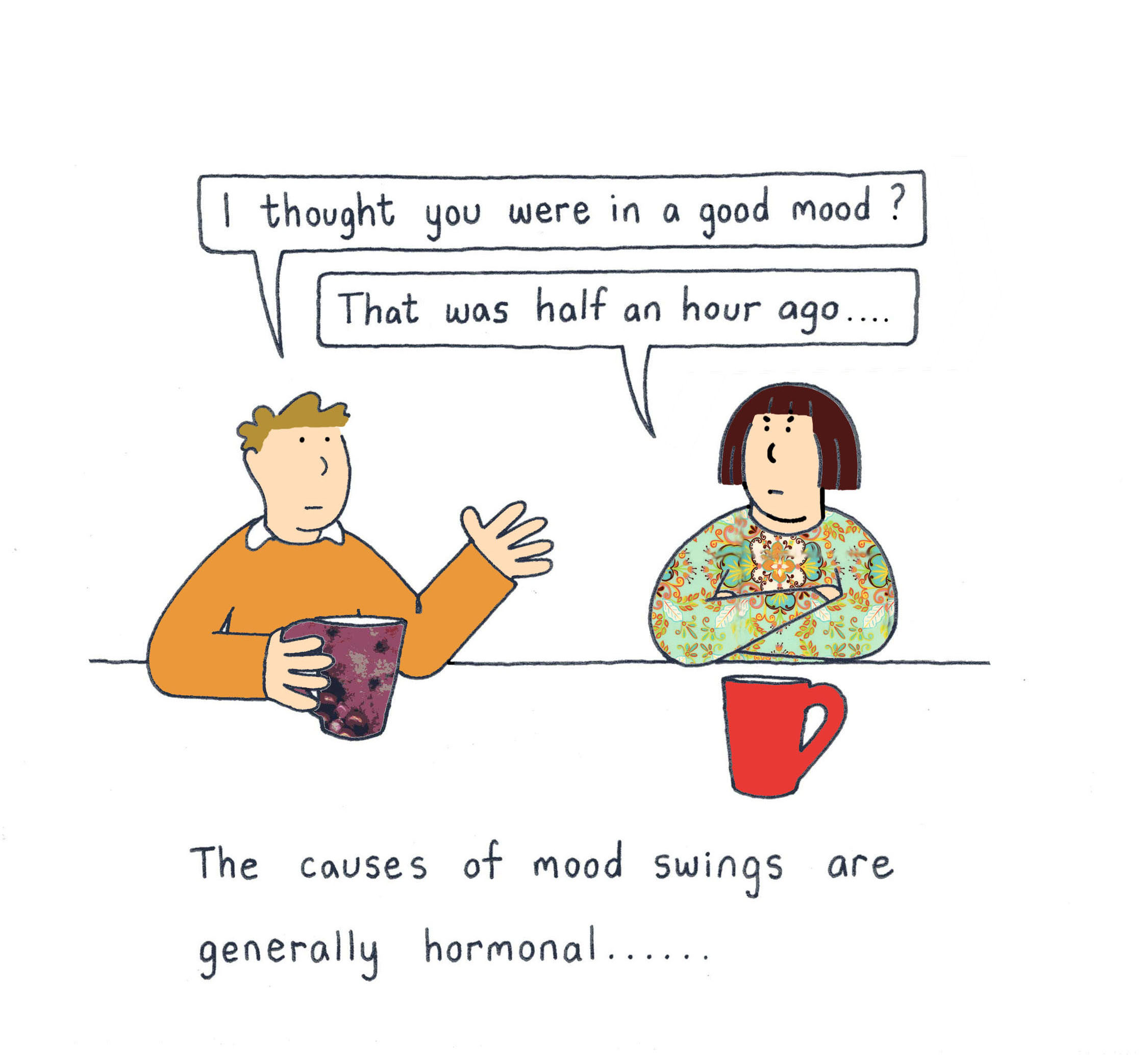Bioidentical hormones for menopause: what’s the latest?
It’s been some time since I covered the topic of bioidentical hormones. And with the lastest review of the Women’s Health Initiative data and yet another push in favour of hormone replacement therapy (HRT), I thought that an update was in order, particularly because the naysayers continue to emphasize that HRT is the end all to be all and that there are not evidence-based alternatives.
Think again.
For those of you who need a refresher in bioidenticals, they are hormones that are molecularly similar to those produced naturally by the body. HRT is manufactured and consequently, has been shown to alter how cell receptor bind to these hormones and function. Bioidentical hormones are often compounded in specialized pharmacies, i.e., they are individualized as directed by a health professional to the exact dosage and regimen required, based on a woman’s personal symptoms, hormone levels, and preference. Yet, claims that they are safer and equally effective alternatives have been challenged, namely due to the lack of scientifically sound data.
At last, that challenge is beginning to change, as more and more women turn away from HRT. In a recent study published in the open access journal BMC Women’s Health, researchers observed 296 menopausal women receiving compounded bioidenticals from six community pharmacies over a period of 7 years.The majority of women in the study were an average of 52 years old, in good health, and of moderate to average rate; most had not used HRT before. Although various compounded forms of bioidenticals were used in the study, the majority were topical, followed by oral, vaginal and under the tongue (sublingual). Moreover, all women were started at low doses of either progesterone as a single therapy or in combination with estrogen and then adjusted accordingly.
Overall and within three to six months after starting therapy, women reported significant improvements in their mood, including at least a 25% reduction in mood swings, irritability and anxiety. They also reported improvements in night sweats and hot flashes. Moreover, women who started on progesterone only therapy had much greater reductions in their mood symptoms compared to women who started on combination therapy.
Bioidentical hormone therapy also proved to be safe, with no woman experiencing a heart attack or developing breast cancer, although importantly, longer follow up times are needed before safety can be firmly established.
So, what are the drawbacks here? First, this was an observational study and undoubtedly, by relying on women to self report symptoms, there’s always room for bias. Still, this is the first well designed trial looking at compounded bioidentical hormones as opposed to manufactured formulations. And, while significant improvements were seen in mood symptoms, the verdict is still out with regards to vasomotor symptoms, i.e. night sweats and hot flashes.
Like any therapy, hormone or alternative, speak to a health practitioner first. Make choices based on information, not simply advice. Right now? Compounded bioidentical hormones appear to offer an advantage over HRT but more study is needed. Clearly, they may not offer the same benefits in terms of flashes but again, more research is needed.
I like the fact that scientists are starting to pay attention. You?
Read MoreFlash dance? Yeah, maybe!
Did you ever watch Flashdance, the 1983 film that tanked in reviews but went on to be one of the highest grossing films that year? Guess it says a lot about our culture. Still, I am not going to say that I didn’t find it entertaining, or that Michael Nouri wasn’t hot in his day. But I digress…
For some reason, the film’s title came to mind when I stumbled across study that examined whether or not aerobic activity could ameliorate hot flashes and night sweats, perhaps because a lot of us dance around the issue rather than address it until it gets intolerable. Or perhaps because it makes a catchy header. Or maybe because Jennifer Beals works up such a sweat during her stand-in’s routine.
Regardless, on the heels of last week’s three-parter on ‘Forties fitness’ and motivating women, I thought I’d share some interesting information regarding physical activity, namely aerobic exercise.
Exercise. I’ve been pushing it for years because for me, it’s my drug of choice. What else offers benefits that include endorphins, wellbeing, bone health, metabolic booster and weight maintenance? And who would have thought that just 5o minutes, four times weekly could have a significant effect on the main cause of menopause flooding, including irritability, clothing changes, sheet replacement and crummy sleep?
That’s what researchers are reporting in Menopause. They discovered that when they assigned menopausal women to 6 months of aerobic training, the women experienced dramatic changes in mood swing, night sweats and irritability. Briefly, the women were divided into two groups:
- 50 minutes unsupervised aerobic training that with walking or Nordic walking (walking with ski poles) at least twice a week added to walking, Nordic walking, jogging, cycling, swimming, skiing, instructed aerobics or step class twice a week, plus two health lectures or,
- Health lectures twice weekly
They researchers were able to track target heart rates (64% to 80% of maximal) because the women in the aerobic training group were monitored and then given feedback All the women also reported the frequency/severity of menopausal symptoms (frequency of night sweats, mood swings, irritability, depressive mood, headache, vaginal dryness and urinary symptoms).
Although declines in symptoms (except vaginal dryness) were seen in both groups (which accounts for what they call a placebo effect, common to all studies), reductions in the prevalence of night sweats, mood swings and irritability were significant only in women engaging in regular aerobic activity. What’s more, because the women recorded their symptoms via a mobile phone, the likelihood that recall issues might come into play were reduced.
So, what about other studies that haven’t shown any benefit from exercise? The researchers point out that in their study, all the women had fairly substantial rates of symptoms (e.g. up to 60% had night sweats, 25% depression/irritability and 30% headache) while in other studies, the numbers at the start of the trials haven’t been quite as robust.
The upshot is that f you don’t care to jump on the hormone train, it can’t hurt to give aerobic activity a whirl. Just be sure to speak to a certified trainer and your health practitioner before diving in.
Read More
Rage against the machine: menopause and irritability
Last week I posted an amusing video about menopausal rage and parking lots. But is uncontrollable irritability really so funny?
An estimated 50% of perimenopausal women report irritability as a major symptom and it tends to worsen the deeper you get into the ‘pause. Depending on how severe hormonal fluctuations, it’s n0t unusual to have excessive and seemingly out of proportion responses to even the most mundane of activities (such as waiting on line at the bank). A road paved with irritability is truly a rocky one and one that will certainly be less well traveled by those people we surround ourselves with. But, without knowing exactly why irritability is so pervasive, it’s difficult to figure out how to address it properly: are mood symptoms during menopause independently linked to hormonal imbalances? Or, are they secondary responses to vasomotor and other symptoms?
Interestingly, researchers took a look at this very question in a small study of 163 peri and postmenopausal women, asking them to complete an 18 question scientific questionnaire designed to measure temporary psychological states. Irritability directed towards others was characterized ‘outward,’ while irritability directed towards oneself was characterized as “inward.” The findings? It appeared that levels of follicle stimulating hormone (FSH) and leutenizing hormone (LH) were significantly linked to outward irritability but there didn’t appear to be any similar correlation to inward irritability. Moreover? Women going through menopause who suffered from chronic illness, e.g. high blood pressure, heart disease, diabetes or thyroid disease had significantly higher scores on both inward and outward irritability measures.
So, do FSH and LH levels directly influence mood and more specifically irritability? Researchers say that there is a relationship but that there is no direct association; in other words, declining or fluctuating hormones don’t directly cause outward irritability. Clearly, it possible that fluctuating hormones as they relate to overall menopause may be responsible, but we still don’t really know. And aging, at least as it relates to being increasingly vulnerable to chronic illness, also appears to play a role.
And there hasn’t been enough research done specifically on this topic to explain why. Meanwhile, as Whoopie Goldberg once said “I don’t have pet peeves. I have whole kennels of irritation.”
Where are your whole kennels? And what are you doing to reel in the irritability when it wants to rear its ugly head?
Read More
Wednesday Bubble: Got symptoms? Got milk? An udder disaster…
Milk is being touted as the next best thing, that is, when it comes to hormonal symptoms. In fact, a new campaign sponsored by the California Milk Processor Board centers around the claim that milk can help reduce the symptoms of PMS. EverythingIdoiswrong.com offers global gauges of PMS symptoms, packaged apologies for men who feel victimized by PMS and even analyzes or verifies their mistakes so that they can avoid them during the next cycle. In a piece about the marketing effort in the Washington Post, Executive Director of the California Milk Processor Board, Steve James, is quoted as saying that the strategy is to “disarm the situation surrounding PMS and its effects,” both for women and individuals around them who are suffering from their mood swings and other symptoms.
Say what?!!!
Is this advertising for milk or a drug claim?
According to the website, the claims about milk are derived from a review that appeared in the year 2000 in the Journal of the American College of Nutrition. In the review, the authors discuss the potential links between altered calcium balance and affective disorders, such as depression and anxiety. Because women with PMS reportedly have calcium fluctuations that interfere with hormonal balance, some researchers have hypothesized that this imbalance can lead to both mood and other features of PMS. In these studies, however, participants obtained their calcium through supplements and not through dietary means; this enabled the researchers to control and standardize intakes (which averaged as much as 1300 mg calcium daily). Translated into daily milk consumption, this means that a person would have to drink more than 4, 8 oz glasses of milk daily to achieve the level of calcium used in clinical studies.
Honestly, do you know anyone over the age of “tween” who consumes that much milk?
Regardless of the studies cited, the claims about milk are exaggerated and inconclusive. Many of the studies were poorly designed or relied upon recall. However, one has to wonder if the milk-PMS claims will set off a cascade of others that stretch to the other end of the hormonal spectrum –menopause — where too much calcium is believed to be too much of a good thing: although calcium may offer protection against osteoporosis, it may also increase the risk for heart disease in some women.
Let’s get away from the hard science for a moment and take a closer look at the campaign. The inference:
- Women: your PMS causes undue suffering to people around you, especially your male partners
- Men: humor the woman in your life. If you want to save your relationship, friendship, partnership, etc, create a photo with puppy eyes, film a video apology or better yet, make fun of her. Oh, and have her drink milk.
Don’t know about you but this one is so absurd it may not even be bubble-worthy. Hey California Milk Processor Board – you may want to add a few women to your marketing team. This one’s an udder disaster.
Hat tip to Reuters Health Executive Editor, Ivan Oransky for the campaign heads up. (I tried to milk it Ivan – how’d I do?!!)
Read More









